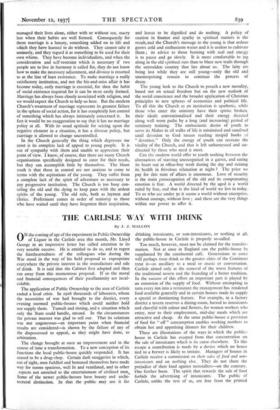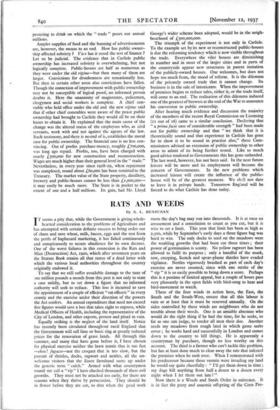THE CARLISLE WAY WITH DRINK
By J. 'J. MALLON
ON the coming of age of the experiment in Public Ownership of Liquor in the Carlisle area this month, Mr. Lloyd George in an impressive letter has called attention to its very notable success. He is entitled to do so, and to regret the faintheartedness of the colleagues who during the War stood in the way of his bold proposal to expropriate everywhere -the private interest in the manufacture and sale of drink. It is said that the Cabinet first adopted and then ran away from this momentous proposal. If so the moral and financial consequences of their pusillanimity are incal- culable. - The application of Public Ownership to the area of Carlisle ended a local crisis. In 1916 thousands of labourers, whom the necessities of war had brought to the district, every evening stormed public-houses which could neither hold nor supply them. Tumult and rioting, and a situation which only the State could handle, ensued. In the circumstances the private interest was glad to sell out. That its solatium was tint ungenerous—an important point when financial results are considered—is shown by the failure of any of the dispossessed to appeal, as they might have done, to arbitration. - The change brought at once an improvement and in the course of time a transformation. To a new conception of its functions the local public-house quickly responded. It has ceased to be a drug-shop. Certain dark snuggeries in which, out of sight, men fuddled and bemused themselves have made way for rooms spacious, well lit and ventilated, and in other . espects not unsuited to the entertainment of civilised men,. Some of the newer public-houses have beauty and archi- tectural distinction. In that the public- may :use it for drinking intoxicants, or non-intoxicants, or nothing at all, the public-house in Carlisle is properly so-called.
Too much, however, must not be claimed for the transfor- mation. Not at once in England can the public-house be supplanted by the continental café. Generations to come will perhaps treat drink as the greater cities of the Continent treat it—as ancillary to a meal or music or conversation. Carlisle aimed only at the removal of the worst features of the traditional tavern and the founding of a better tradition. In the success of this effort an important part is played by an extension of the supply of food. Without attempting to turn every inn into a restaurant the management has rendered food available generally and in certain houses made its supply a special or dominating feature. For example, in a factory district a tavern reserves a dining-room, barred to intoxicants and cheerful with colour and flowers, for women workers who enjoy, near to their employment, mid-day meals which are attractive and cheap. At the same public-house a provision of food for " off " consumption enables working mothers to obtain hot and appetising dinners for their children.
These are illustrations of- the ways in which the public- house in Carlisle has escaped from that concentration on the sale of intoxicants which is its curse elsewhere. To this escape a contribution is made by a device which no house tied to a brewer is likely to imitate. Managers of houses in Carlisle receive a commission on their sales of food and non- intoxicants and on nothing else. They do not share the prejudice of their kind against teetotallers—on the contrary. One further boon. The spirit that rewards the sale of food forbids the advertising of intoxicants. The public of Carlisle, unlike the rest of us, are free from the printed pestering to drink on which the " trade " pours out annual millions.
Ampler supplies of food and the banning of advertisements are, however, the means to an end. How has public owner- ship affected sobriety ? Fei N has it stood the test of finance ? Let us be judicial. The evidence that in Carlisle public ownership has increased sobriety is overwhelming, but not logically complete. Public-houses are half as numerous as they were under the old regime—but then many of them are larger. Convictions for drunkenness are sensationally less. But then in certain other areas also convictions have fallen. Though the connexion of improvement with public ownership may not be susceptible of logical proof, no informed person doubts it. Here the unanimity of magistrates, policemen, clergymen and social workers is complete. A chief con- stable who held office under the old and the new regime said that if other chief constables were aware of the peace public ownership had brought to Carlisle they would all be on their knees to obtain it. He explained that the main cause of the change was the altered status of the employees who, as civil servants, work with and not against the agents of the law. Such testimony, and there is no end of h, establishes the moral case for public ownership. The financial case is no less con- vincing. Out of profits purchase-money, roughly L7oo,000, was long ago repaid. Profits, too, have been charged with nearly £500,000 for new construction and reconstruction. Wages are much higher than their general level in the " trade." Nevertheless, in every year since 1928-29, when repayment was completed, round about £6o,000 has been remitted to the Treasury. The market value of the State property, distillery, brewery and public-houses cannot be less than £1,000,000— it may easily be much more. The State is in pocket to the extent of one and a half millions. Its gain, had Mr. Lloyd George's wider scheme been adopted, would be in the neigh- bourhood of £500,000,000.
The triumph of the experiment is not only in Carlisle. To the example set by its new or reconstructed public-houses is due the reforming tendency which is now visible throughout the trade. Everywhere the viler. houses are diminishing in number and in most of the larger cities and in parts of the countryside appear new structures in patent imitation of the publicly-owned houses. One welcomes, but does not hope too much from, the mood of reform. It is the dilemma of the privately owned trade that it cannot change. Its business is in the sale of intoxicants. When the improvement of premises begins to reduce sales, either it, or the trade itself, will come to an end. The realisation of this dilemma induced one of the greatest of brewers at the end of the War to announce his conversion to public ownership.
After hearing much evidence and discussion the majority of the members of the recent Royal Commission on Licensing out of 16) came to a similar conclusion. Declaring that " a prima facie case of considerable strength " had been made out for public ownership and that " we think that it is theoretically sound and that experience in Carlisle has gone far to show it to be sound in practice also," these Com- missioners advised an extension of public ownership to other areas to admit of its being further tested. Like so much good advice tendered to Governments this has gone unheeded. The last word, however, has not been said. In the near future leisure will be more and its employment will become the concern of Governments. In the new problems which increased leisure will create the influence of the public- house will be of the greatest moment. We shall not dare to leave it in private hands. Tomorrow- England will be forced to do what Carlisle has done today.















































 Previous page
Previous page